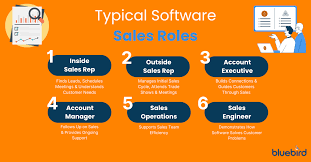Introduction
In an era defined by digital transformation, the software industry has experienced explosive growth. With this surge comes an increasing demand for professionals who can effectively sell these innovative products to businesses and consumers. Software sales jobs have emerged as a crucial pillar within the tech sector, offering lucrative income potential, career advancement, and opportunities to work with cutting-edge technologies. This comprehensive guide explores the landscape of software sales jobs, including job roles, required skills, compensation structures, and tips for building a successful career in this dynamic field.
1. Understanding Software Sales
Software sales involves the process of selling software solutions to individuals, businesses, or organizations. Sales professionals in this space identify customer needs, present relevant software products, and close deals that result in successful implementations.
Types of software commonly sold include:
- Enterprise Resource Planning (ERP) systems
- Customer Relationship Management (CRM) platforms
- Project management tools
- Cybersecurity software
- Cloud-based services
- Artificial Intelligence (AI) solutions
2. Types of Software Sales Jobs
Software sales jobs span a range of roles, each with unique responsibilities and compensation models. Common positions include:
a. Sales Development Representative (SDR)
- Entry-level position
- Focuses on lead generation, outreach, and initial qualification
- Often involves cold calling and email campaigns
b. Account Executive (AE)
- Mid-level role responsible for closing deals
- Manages the full sales cycle
- Collaborates with SDRs and technical teams
c. Account Manager
- Focuses on maintaining and growing existing customer relationships
- Ensures client satisfaction and handles renewals or upsells
d. Sales Engineer (SE)
- Acts as a technical expert in the sales process
- Provides product demonstrations and technical validation
e. Channel Sales Manager
- Manages relationships with resellers, distributors, and partners
- Coordinates indirect sales efforts
f. Enterprise Sales Executive
- Handles large, complex deals with major clients
- Requires deep industry knowledge and high-level negotiation skills
3. Skills Required for Software Sales
To excel in software sales, professionals need a blend of soft and hard skills:
a. Communication Skills
- Ability to explain technical concepts in simple terms
- Strong presentation and negotiation capabilities
b. Product Knowledge
- Deep understanding of the software being sold
- Familiarity with competitors and market trends
c. Technical Acumen
- Basic understanding of IT systems, APIs, cloud computing, etc.
- Ability to work with Sales Engineers and development teams
d. Customer-Centric Approach
- Focus on understanding client pain points
- Ability to tailor solutions based on specific needs
e. Sales Methodologies
- Familiarity with sales frameworks like SPIN Selling, MEDDIC, or Challenger Sale
f. CRM Proficiency
- Experience using tools like Salesforce, HubSpot, or Zoho CRM to manage pipelines and client interactions
4. Education and Training
While a college degree is often preferred, it is not always required. Common educational backgrounds include:
- Business Administration
- Marketing
- Computer Science
- Communications
Certifications and training programs can also boost credibility, such as:
- Certified Inside Sales Professional (CISP)
- Salesforce Sales Certification
- HubSpot Inbound Sales Certification
5. Salary Expectations and Compensation Models
Software sales can be highly rewarding financially. Compensation often includes a base salary plus commissions or bonuses based on performance.
a. Entry-Level (SDR):
- Base Salary: $40,000–$60,000
- Total Compensation with Commission: $60,000–$80,000
b. Account Executive:
- Base Salary: $60,000–$100,000
- Total Compensation: $100,000–$150,000+
c. Enterprise Sales:
- Base Salary: $100,000–$150,000
- Total Compensation: $200,000–$300,000 or more
Commission models vary:
- Revenue-based
- Profit-based
- Tiered commissions

6. Day-to-Day Responsibilities
The daily routine of a software sales professional typically includes:
- Prospecting new leads
- Conducting discovery calls
- Creating and delivering presentations
- Managing CRM entries
- Following up with clients
- Coordinating with internal teams
7. Career Path and Advancement
Software sales offers clear upward mobility. Typical career progression:
- SDR → AE → Senior AE → Sales Manager → Director of Sales → VP of Sales → Chief Revenue Officer (CRO)
Alternatively, one can move into:
- Product Management
- Customer Success
- Marketing or Business Development
8. Remote Work and Global Opportunities
Many software sales jobs offer remote or hybrid work options. The global demand for software solutions also enables cross-border opportunities, allowing professionals to work with international clients and companies.
9. Challenges in Software Sales
While rewarding, software sales comes with its share of challenges:
- High pressure to meet quotas
- Rapidly changing technology landscape
- Need for continuous learning
- Competition from other vendors
10. How to Get Started in Software Sales
a. Build a Strong Resume: Highlight transferable skills and achievements b. Network: Connect with sales professionals on LinkedIn, attend industry events c. Apply for Entry-Level Roles: Look for SDR or BDR positions d. Prepare for Interviews: Understand the company’s products and market e. Practice Cold Calling and Emailing: Many companies will assess your communication style
11. Best Companies for Software Sales Careers
Top software companies known for excellent sales teams include:
- Salesforce
- Microsoft
- Oracle
- HubSpot
- Adobe
- IBM
- Zoom
- Snowflake
12. Tools and Resources for Software Sales Professionals
a. CRM Tools: Salesforce, Pipedrive, Zoho b. Sales Enablement: Outreach, SalesLoft, Gong c. Learning Platforms: Coursera, LinkedIn Learning, Sandler Training d. Industry News: TechCrunch, SalesHacker, Gartner
Conclusion
Software sales jobs are among the most dynamic and lucrative careers in the modern economy. With the right mix of communication skills, technical understanding, and perseverance, professionals can thrive in this fast-paced environment. Whether you’re just starting out or looking to advance to enterprise sales or leadership, the software sales industry offers boundless opportunities for growth, innovation, and impact. As technology continues to evolve, so too will the roles and strategies within software sales—making it a field full of promise for the future.
